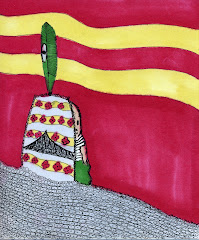HIS END AND HIS BEGINNING
Jorge Luis Borges: from: In Praise of Darkness. 1969.
After dying, now alone, torn apart, and rejected by his body, he fell asleep. When he woke up, his usual habits and customs were waiting for him. He told himself that he shouldn’t think too much about what happened the night before and, spurred on by this resolution, he dressed in a leisurely fashion. At the office, he went about his tasks efficiently enough, though he had the unsettling impression that he was repeating something that had already been done before, caused often by fatigue. He had the sense that the others were avoiding looking at him, perhaps because they knew that he had already died. That evening his nightmares began and though he could retain nothing the next morning, he was still fearful that there would be more. After a while, this fear was justified; it came between him and the page he was working on or the book he was attempting to read. The letters on the paper slithered and pulsated, and some faces familiar to him grew indistinct, men and objects gradually drifted away from him. His mind gripped on to these changing forms as if in a frenzy of tenacity.
As strange as it might seem, he never suspected the truth; it came to him all at once. He finally understood that he could not remember shapes, sounds, or colors in his dreams, that there really were no shapes or sounds or colors, and that they were not dreams at all. They were his reality, a reality well beyond silence and sight, and therefore beyond memory. This perturbed him much more than the fact that after dying he had been fighting against a chaos of senseless images. The voices he had been hearing were echoes; the faces, masks. The fingers of his hand were shadows, blurry and unreal, but still familiar and recognizable to him.
Somehow though, he knew that it was his duty to leave behind all those things. He now belonged to another world, detached from past, present, and future. Gradually this new world began to surround him. He underwent much agony, went through regions of despair and and solitude. These wanderings were particularly atrocious, because they went beyond all of his former perceptions, remembrances, and hopes. All their horror came from being so new and splendorous. He was worthy of grace --all that time since death he had been in heaven.
translated by Alexander Coleman















